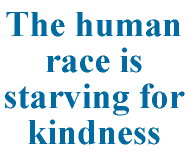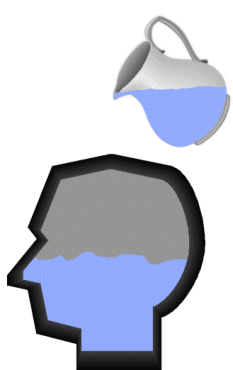"How To Help Others"
continued from Home Page
He would exit the chapel after most of the others had preceded him. He seemed to make an effort to seek me out. Then in a heavily congested, highly distorted growl he would say what sounded like “uuuuuuuh errrrrmon evvven”.
Several weeks passed before I figured out that he was saying to me, “good sermon Reverend”. Then, adding to the incongruity of the interaction, I learned that he was mentally retarded (brain damaged from an accident)—that he would not truly know what a good sermon was if he heard one.
 His
limitations did not matter to me. I continued to anticipate his weekly
gift to me. I looked for him. I waited for him. I missed him if he was
absent. His distorted noise, uttering a sentence he’d copied from someone
somewhere, invariably made me feel better. His invalid compliment always
lifted my spirits.
His
limitations did not matter to me. I continued to anticipate his weekly
gift to me. I looked for him. I waited for him. I missed him if he was
absent. His distorted noise, uttering a sentence he’d copied from someone
somewhere, invariably made me feel better. His invalid compliment always
lifted my spirits.
He taught me something. I learned from him that I, like others, need positive words and will value them from any source. I realized from that damaged gift-giver that every human being can help another. No one has nothing to offer. Everyone can prop up another human being. All s/he has to do is offer some kind and caring words. The human race is starving for kindness, hungry for encouragement. And all God’s people carry an endless supply of the needed bread.
To carry a supply of tasty nutritious bread and fail to give it to the hungry is committing a felony of the spirit. We all can plead guilty to this charge. But our habits can change right now. No higher education needed.
No advance degrees required. Just decide that you are going to notice
people wherever you go and hand out free bread—in the shape of a warm
greeting, a genuine smile or an upbeat compliment.
Recently, I was sharing the vision of our International Conference on Care and Kindness. Afterward a woman from San Francisco told me her experience that validated the power of simple acts of care and kindness. She reported that a week earlier, when crossing the Golden Gate Bridge, a toll booth operator had returned her change saying, “have a blessed day”. At the height of morning rush hour, with thousands of anonymous faces throwing money at him, he had blessed her!
She went on to detail how his words absolutely changed her day for the better. Later that afternoon a nasty confrontation was deflected when her words, still softened by the spirit lifting caress of the anonymous toll-taker, spoke gently in a tense situation.
LA Times columnist Sandy Banks recently devoted two columns in one week highlighting the unique graciousness of a security guard at an LA County Social Security office. This man cheers everyone who steps onto the premises. He is like an angel of kindness, turning routine drudgery into a pleasant interlude. This modestly-paid citizen acts like an inspired missionary, not an hourly employee dragging through a day. One lady said, “No matter how crowded it gets, there he is, juggling everybody’s needs and talking to people, placating them . And always smiling.”
When confronted with the overwhelming good he does, Anthony Williams responded with a smile, “What if you knew you could lighten somebody’s burden just by doing the best job you can?”
TRY THIS. SATISFACTION GUARANTEED.
Try it! Your days will be revolutionized. Keep at the front of your mind the intention to lift people.
- At the grocery store, say sentences of appreciation to the cashiers and aides.
- Gently decline when the power tactics of intrusive telemarketers aggravate.
- Graciously let other drivers into the traffic flow.
- Smile at folks of other races as you pass them in the mall.
Here is a guarantee! When you carry an agenda of care and kindness, you will feel better. Your spirit will be calmer, your heart will beat more quietly. In the process of caring for others, you glean wonderful benefits yourself. Guaranteed!
Anthony Williams said, “I’ll tell you something. When you smile at somebody, you find it makes you feel better too.”
Put Gratitude Into Words
I attended a small concert recently, put on by a fabulous classical musician. At the conclusion, there was a tremendous time of applause, and then it was time to go home. Curious, I watched to see how many of the appreciative audience went up to the performer to offer personal words of appreciation. Of the approximately two hundred, I counted six who lingered to say something.
This happens all the time. A speaker delivers a helpful lecture, a colleague contributes a meaningful personal devotion, virtually no one bothers to stay around and put their gratitude into words. Why is this?
I believe the reason so few bless others even when they feel moved in their spirit and touched by a sermon, lecture or story, is that they do not believe their own words will matter to the performer. They do not value their own response enough to think it will be received with appreciation. And the flip-side of their failure to give their gift is an odd misreading of the neediness of those who stand up front and make a contribution. Somehow they regard “up front” types as self-sufficient, buoyed up by resilient egos that need no compliments.
Try This Too
Here is assignment number two. In the next twelve months, whenever you are at a lecture, recital, or chapel talk, spend an extra three minutes thanking the one who spoke, played or shared. You will bless them. Guaranteed! They need your words, no matter who you are. Remember my encourager at the State Hospital? Spill your blessings on folks. They need them. And re-program how you think of yourself. You have a lot more to offer than you think you do.
Dr. James Kok is Director of Care Ministry for the Crystal Cathedral Congregation of Garden Grove, CA. He has been an ordained minister of the Christian Reformed Church of America for 35 years. He speaks extensively throughout the United States and Canada. His hands-on work as a pastor has led to a profound understanding of the issues and dynamics of personal grief and human suffering on which he has written and spoken at length.